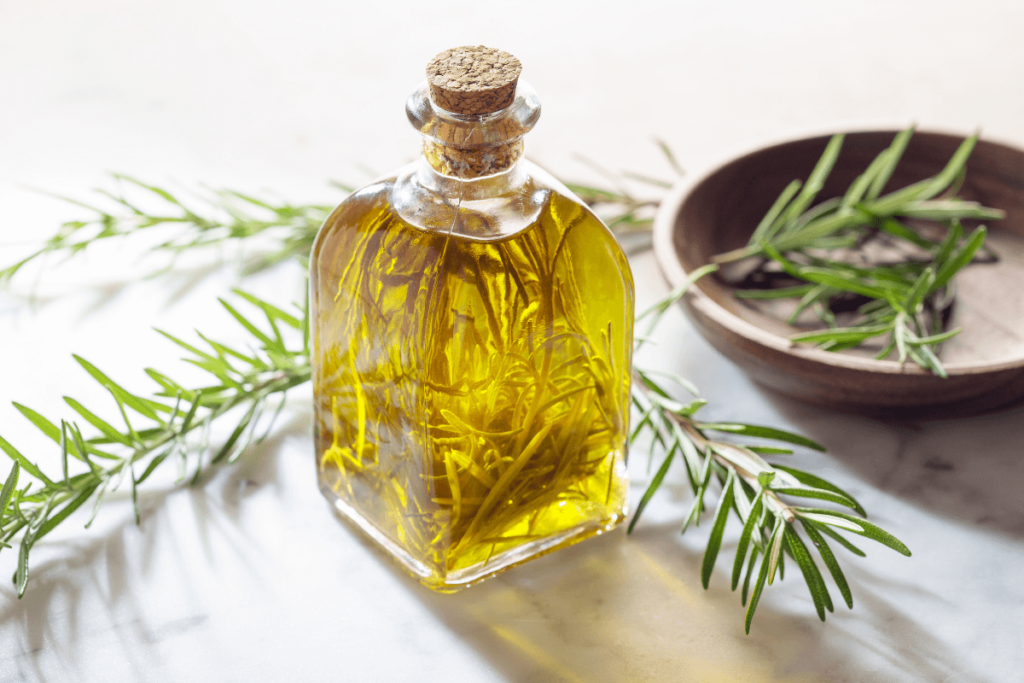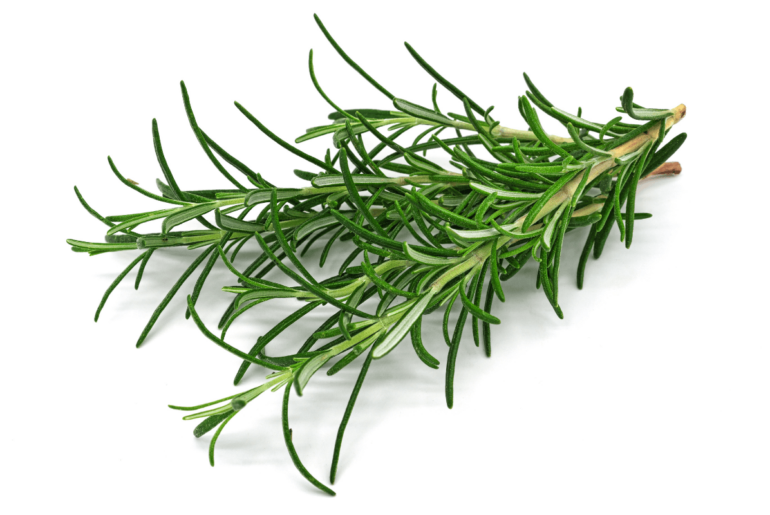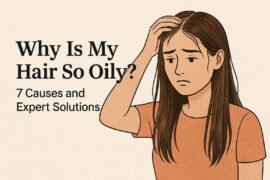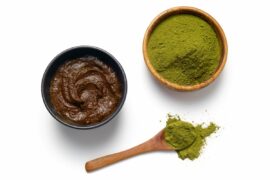Rosemary, scientifically known as Rosmarinus officinalis, has been a cherished herb in culinary and therapeutic practices for centuries. Originating from the Mediterranean region, this aromatic herb enhanced the flavor of countless dishes. It embarked on a journey through time as a potent remedy for various ailments and beauty concerns, particularly hair care.
Rosemary for Hair Care
A Glimpse into History: Rosemary in Culinary and Hair Care
In the culinary world, rosemary has been a quintessential herb, imparting a distinctive flavor and aroma to many dishes, from roasted meats to flavorful bread. Beyond the kitchen, rosemary carved out a significant niche in the hair care realm.
Historical records reveal that the Greeks, Romans, and Egyptians utilized rosemary to enhance hair growth, prevent premature graying, and combat hair loss.
The Essence of Rosemary: Understanding Rosemary Essential Oil

Rosemary essential oil is extracted through steam distillation from the flowering tops and leaves of the rosemary plant. This oil is revered for its myriad benefits, particularly its ability to stimulate hair follicles, promote growth, and thwart hair loss.
Its rich antioxidant properties and circulation-boosting capabilities have made it a staple in various hair care formulations.
Rosemary Oil: Beyond a Culinary Herb to a Hair Care Marvel
The use of rosemary oil for hair growth and as a remedy for hair loss transcends its aromatic presence in culinary arts, entering a domain where its antioxidant benefits and properties are harnessed for scalp and hair care.
The oil, extracted from the rosemary leaf, is believed to stimulate hair follicles, promote hair growth, and potentially prevent hair loss.
Numerous scientific studies underscore the benefits of rosemary oil in addressing hair loss. A notable study published in the Journal of Dermatology compared the effects of rosemary oil and minoxidil, a conventional hair loss treatment. The results showcased that rosemary oil was just as effective as minoxidil in promoting hair growth, with fewer side effects such as scalp itching.
Scientific Backing: The Efficacy of Rosemary Oil for Hair Loss
In the realm of natural remedies for hair loss and growth enhancement, rosemary oil has emerged as a potent contender, backed by scientific studies and historical usage.
The essential oil, derived from the rosemary leaf, has been a subject of interest in various research endeavors exploring its efficacy, particularly in the context of androgenetic alopecia (AGA) and Central Centrifugal Cicatricial Alopecia (CCCA).
Addressing Diverse Alopecia Conditions with Natural Remedies
Central Centrifugal Cicatricial Alopecia (CCCA) predominantly affects women of African descent, presenting a scarring alopecia that can be challenging to manage due to limited treatment modalities. A systematic review aimed to explore the potential of natural ingredients, including rosemary oil, in treating CCCA, revealing a gap in randomized, controlled studies specifically targeting this condition. However, the study did highlight the promise shown by several botanical and natural ingredients in treating other forms of alopecia, such as alopecia areata and AGA, suggesting a potential avenue for future research and treatment development in CCCA (PubMed).
Rosemary Oil: A Potential Ally in Treating Male AGA
AGA (Androgenic Alopecia), a prevalent cause of hair loss in men, has traditionally been treated with FDA-approved topical minoxidil and oral finasteride. However, due to the long-term application requirement of minoxidil and the potential undesirable side effects of finasteride, natural products like rosemary oil have been explored as alternatives or adjuncts in treatment.
A systematic review of clinical studies suggested that rosemary oil, among other natural products, might be considered in male AGA treatment, providing a natural avenue for those skeptical about conventional treatments or seeking to enhance clinical outcomes (Dermatol Ther).
Harnessing the Power of Rosemary: Practical Applications for Hair Growth
How to Utilize Rosemary Oil for Optimal Hair Growth: A Comprehensive Guide
Embarking on a journey to enhance hair growth and mitigate hair loss naturally, rosemary oil emerges as a potent ally, offering a blend of historical wisdom and contemporary practices in hair care. With its rich antioxidant benefits and properties that stimulate hair follicles, understanding how to use rosemary oil for hair growth can unlock a world of natural, effective hair care practices.
Harnessing the Essence: Rosemary Essential Oil vs. Infused Oil
When discussing rosemary oil, it’s pivotal to distinguish between rosemary essential oil and rosemary-infused oil. Rosemary essential oil is a concentrated extract derived directly from the rosemary herb, encapsulating the potent properties of rosemary in a small, undiluted volume. On the other hand, rosemary-infused oil involves steeping rosemary leaves in a carrier oil, such as jojoba or olive oil, allowing the properties of rosemary to permeate the carrier oil over time.
Step-by-Step Guide to Using Rosemary Oil for Hair Growth
Choosing Your Oil:
Rosemary Essential Oil: Known for its concentrated properties, ensure to dilute rosemary essential oil with a carrier oil (like jojoba oil) before application to avoid irritation.
Rosemary Infused Oil: This can be used directly on the scalp and hair, as it is already diluted and typically gentler.
Application Method:
Direct Scalp Massage: Gently massage the rosemary oil into your scalp. Ensure to cover all areas, focusing on regions experiencing hair thinning or loss. You can use a dropper to apply the oil or dip your fingers into it and then apply it to your scalp.
Hair Mask: Mix rosemary oil with other beneficial ingredients like honey or egg yolk to create a nourishing hair mask. Apply to the hair and scalp, leaving it on for an hour or two before washing.
In Your Hair Care Products: Add a few drops of rosemary essential oil to your shampoos, conditioners, or hair masks to enhance their benefits.
Consistent Use:
Regularly use rosemary oil; regular application is key to observing tangible benefits in hair growth and health.
Observation and Adjustment:
Monitor how your hair and scalp respond to the rosemary oil and adjust usage accordingly. If any irritation occurs, discontinue use.
Related: Benefits of Brahmi for Hair
Crafting Your Own Rosemary Infused Oil: A Simple Recipe
Creating your own rosemary-infused oil allows you to harness the benefits of rosemary in a gentler form, suitable for regular use.
Here’s a simple rosemary hair oil recipe:
Ingredients: Fresh or dried rosemary leaves, Vitamin E gel or oil, and carrier oil (e.g., olive oil or jojoba oil).
Method: Place rosemary leaves in a jar and cover them with the carrier oil. Add Vitamin E oil, which will prevent your oil from going rancid.
Seal the jar and allow it to sit in a warm, dark place for several weeks, shaking occasionally.
Usage: Once infused, strain the oil to massage the scalp, add to hair care products, or apply directly to the hair.
Note: Conduct a patch test when trying rosemary oil for the first time to avoid adverse reactions. Always prioritize quality and purity when selecting essential oils, and consider consulting a healthcare professional or a certified aromatherapist for personalized advice.
Rosemary Tea for Hair Growth: A Natural Elixir for Luscious Locks
The journey towards achieving robust hair growth often leads us down the path of exploring natural remedies. Rosemary, has also carved out a significant niche through the use of rosemary tea for hair growth.
Brewing a Potent Concoction: Rosemary Tea and Its Allies
Creating a rosemary tea for hair involves steeping rosemary leaves in hot water, allowing the beneficial properties of the herb to infuse into the liquid. But the potency of this natural remedy can be amplified by incorporating other herbs known for their hair-enhancing properties:
Fenugreek Seeds: Renowned for promoting hair growth and combating dandruff.
Dried Amla Berries: A powerhouse of antioxidants and vitamin C, amla strengthens hair and stimulates hair follicles.
Hibiscus Flowers: Known to prevent hair loss, promote hair growth, and offer conditioning properties.
How to Use Rosemary Tea for Hair Growth: A Step-by-Step Guide
Brewing the Tea:
- Combine rosemary leaves with your chosen herbs (fenugreek seeds, dried amla berries, and hibiscus flowers).
- Allow the mixture to steep in hot water for 15-20 minutes.
- Strain the tea and allow it to cool.
Application:
- Use the tea as a hair rinse, pouring it over your scalp and hair after shampooing.
- Gently massage the tea into your scalp, ensuring it permeates the hair follicles.
- Optionally, leave the tea in your hair for additional absorption or rinse it after an hour.
Consistent Usage:
For optimal results, incorporate the rosemary tea rinse into your regular hair care routine, utilizing it several times a week.
A Personal Touch: The Miraculous Rosemary Concoction
The anecdote of the special rosemary concoction used by my mother-in-law underscores the potential of this herb in hair care. Applied daily to the scalp for one month, the concoction facilitated hair regrowth in a bald spot and significantly increased hair density and length. This personal experience serves as a testament to the potential benefits of rosemary in hair care, particularly when used consistently and methodically.
When applied to the scalp, Rosemary tea can be a potent remedy for enhancing hair growth. To make rosemary tea, simply steep fresh or dried rosemary leaves in hot water, allow it to cool, and then apply it to the scalp. Regularly using this herbal infusion can stimulate hair follicles, enhance hair growth, and improve overall scalp health.
Before and After: The Transformative Journey with Rosemary Oil
Utilizing rosemary oil for hair growth can yield visible results over time. Before and after photos often reveal a noticeable difference in hair density, length, and overall health. From mitigating hair loss to enhancing the luster and vitality of tresses, rosemary oil stands out as a natural, effective solution in hair care.
Conclusion
With its rich history and scientifically-backed benefits, Rosemary emerges as a potent ally in combating hair loss and promoting growth. From the aromatic kitchens of ancient civilizations to the modern-day pursuit of natural beauty remedies, rosemary oil, and tea continue to weave their magic, offering a green, productive alternative in the hair care realm.
FAQ
1. Can rosemary oil cause hair loss?
No, rosemary oil is not known to cause hair loss.
In fact, it’s often used to potentially prevent hair loss and promote hair growth due to its ability to stimulate hair follicles. However, like any product, individual reactions can vary, and it’s always recommended to conduct a patch test to ensure no adverse reactions occur.
2. How to use rosemary oil for hair growth?
To use rosemary oil for hair growth, massage it into your scalp, add it to your hair products, or use it as a hair mask. Regular and consistent application is key to observing potential benefits, such as improved hair growth and health.
3. How to dilute rosemary oil for hair?
Mix a few drops of essential oil with a carrier oil, such as coconut, jojoba, or olive oil, to dilute rosemary oil for hair. A general guideline is adding 3-5 drops of rosemary per tablespoon of carrier oil. This ratio ensures the essential oil is safe and gentle for direct skin application.
4. What is rosemary oil good for?
Rosemary oil is celebrated for various potential benefits, including stimulating hair growth, preventing hair loss, alleviating dandruff, and improving hair and scalp health. Additionally, it’s known for its aromatic properties and is often used in aromatherapy, improving memory and skincare.
5. How long to leave rosemary oil in the hair?
If you’re using rosemary oil as a hair mask or treatment, leaving it in for at least 15-30 minutes before washing it out is generally recommended. Some individuals leave it overnight (ensuring to protect their bedding) for a more intensive treatment.
6. Can I put rosemary oil directly on my hair?
Pure rosemary essential oil should not be applied directly to the hair or scalp without being diluted first. Always mix rosemary essential oil with a carrier oil before application to avoid irritation. However, if you’re using a pre-made rosemary-infused oil or product designed for hair use, you can apply it directly per the product’s instructions.
7. How to apply rosemary oil to the scalp?
To apply rosemary oil to the scalp,
- Ensure it is properly diluted with a carrier oil if you’re using rosemary essential oil.
- Part your hair in sections to expose the scalp.
- Use a dropper or your fingers to apply the oil directly to the scalp.
- Gently massage the oil into the scalp using circular motions, ensuring even coverage.
- Allow it to sit for the recommended duration before washing it out.
Always remember to conduct a patch test when trying a new oil or product to ensure no adverse reactions occur.









